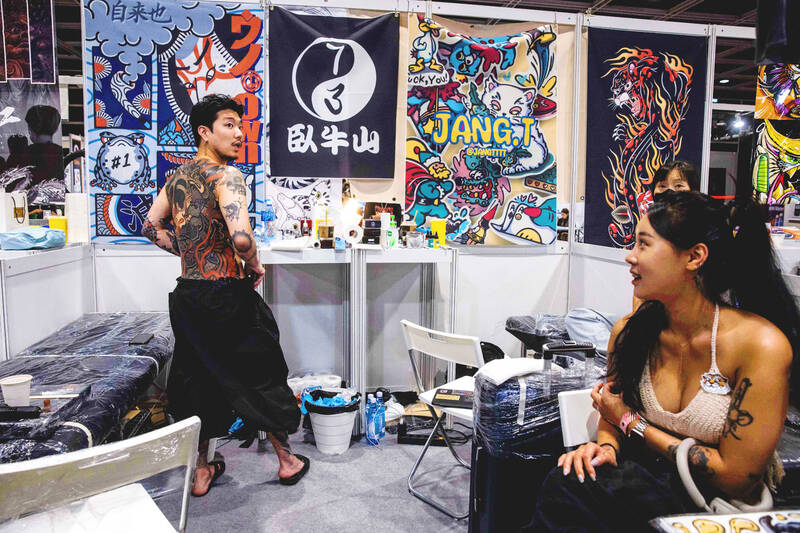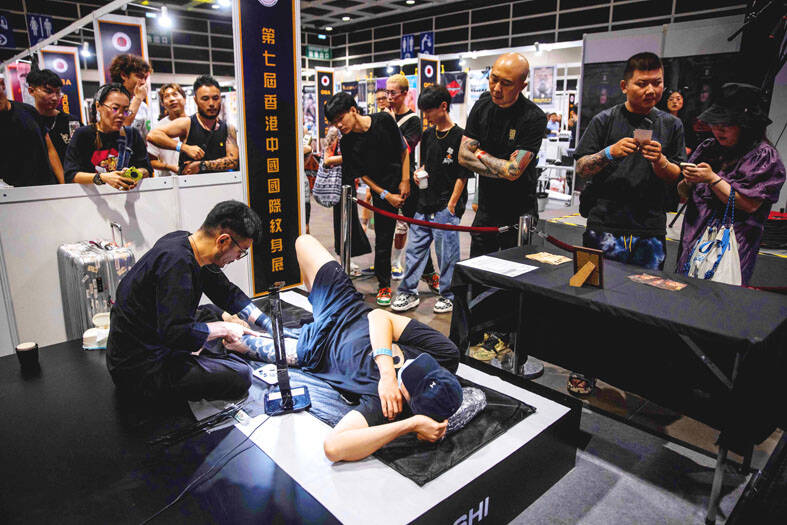Sousyu Hayashi peers at the intricate pattern of sakura blossoms before him, borne from 30 hours of deft prodding by his traditional Japanese tattoo needle — and he is not even halfway done.
Surrounded by admiring onlookers, the 47-year-old is among the 130 tattoo artists who have set up stalls at the Hong Kong China International Tattoo Exhibition running until today, where attendees can pick out designs from an eclectic lineup and get inked on the spot.
Hayashi is a master of tebori, Japanese for “handcrafted,” where the skin is pierced by a steel-tipped bamboo rod with no mechanical help. Only a handful of practitioners are left, he said.

Photo: AFP
“I’m never satisfied,” he said. “I’ve done this for 24 years, and at home, I’m always practicing.”
Heavyweights like Hayashi brought a much-needed jolt to Hong Kong’s tattoo community, which has grown rapidly over the years, said Gabe Shum, organizer of the exhibition.
Tattoos in the territory used to be associated with organized crime, but Shum, 60, said that over time he has witnessed a “growing acceptance” among the public.

Photo: AFP
The Malaysian-born tattoo artist started decorating skin at 19 and went on to enjoy a storied career that has included inking sports legends David Beckham and LeBron James.
“When I returned to Hong Kong to start my business, there were only four tattoo parlors,” Shum said. “Today, there are 300 to 400 tattoo artists.”
“People had misunderstandings and biases... We did a lot to explain and destigmatize,” he said.
The convention, which began a decade ago, also draws fans from China, where tattoos have spiked in popularity even though the Chinese Communist Party has discouraged them.
A man from the Chinese city Chongqing, who gave his surname as Xiang, said he brought along his five-year-old daughter to the event as a family outing.
“She’s a kid, she thinks [tattoos] are no different from painting, and she loves to play around with a paintbrush,” he said.
Xiang’s favourite tattoo, a brightly colored rooster on his chest, was picked to match his daughter’s Chinese zodiac sign, he said.
“I got that as a way to make myself happy, to express joy,” he said.
Tattoo artists from Hong Kong make up around one-third of this year’s lineup, which Shum said shows the “rapid development” of the industry locally.
However, they were dealt a heavy blow during the COVID-19 pandemic, as the government forced beauty salons — a category that includes tattoo parlous — to close for months at a time to reduce transmission of the virus.
Mini Lau began her tattoo business in 2018, bringing techniques she learned in South Korea back to her home, where her designs featuring fine lines and pastel colors have become a hit with younger women.
She recalled how, in school, her friends would ask her to draw on their arms for fun.
“It gave me a sense of accomplishment, the way it made my classmates happy... I thought, if the pictures were real tattoos, that would be cool,” 28-year-old Lau said.
She eventually decided to quit high school and apprentice with a tattoo artist. For a period, she could only practice drawing around midnight as she held down a day job in sales.
“I didn’t tell my parents... Until one day my brother saw an interview of me in the newspaper and showed it to my dad,” Lau said with a laugh.
Learning to be a tattoo artist had been a “bumpy path” for her, Lau said, adding that she hoped the industry would be more accessible to newcomers.
The convention was a step in the right direction, she said.
For those without any ink, the event proved to be a chance to experiment.
A woman who gave her name as Jennifer said she decided to get her first tattoo after being wowed by a calligraphy design.
“I had been thinking about it for a while... I know it’s an impulsive decision, but it felt right,” she said.

To many, Tatu City on the outskirts of Nairobi looks like a success. The first city entirely built by a private company to be operational in east Africa, with about 25,000 people living and working there, it accounts for about two-thirds of all foreign investment in Kenya. Its low-tax status has attracted more than 100 businesses including Heineken, coffee brand Dormans, and the biggest call-center and cold-chain transport firms in the region. However, to some local politicians, Tatu City has looked more like a target for extortion. A parade of governors have demanded land worth millions of dollars in exchange

Hong Kong authorities ramped up sales of the local dollar as the greenback’s slide threatened the foreign-exchange peg. The Hong Kong Monetary Authority (HKMA) sold a record HK$60.5 billion (US$7.8 billion) of the city’s currency, according to an alert sent on its Bloomberg page yesterday in Asia, after it tested the upper end of its trading band. That added to the HK$56.1 billion of sales versus the greenback since Friday. The rapid intervention signals efforts from the city’s authorities to limit the local currency’s moves within its HK$7.75 to HK$7.85 per US dollar trading band. Heavy sales of the local dollar by

Taiwan Semiconductor Manufacturing Co’s (TSMC, 台積電) revenue jumped 48 percent last month, underscoring how electronics firms scrambled to acquire essential components before global tariffs took effect. The main chipmaker for Apple Inc and Nvidia Corp reported monthly sales of NT$349.6 billion (US$11.6 billion). That compares with the average analysts’ estimate for a 38 percent rise in second-quarter revenue. US President Donald Trump’s trade war is prompting economists to retool GDP forecasts worldwide, casting doubt over the outlook for everything from iPhone demand to computing and datacenter construction. However, TSMC — a barometer for global tech spending given its central role in the

An Indonesian animated movie is smashing regional box office records and could be set for wider success as it prepares to open beyond the Southeast Asian archipelago’s silver screens. Jumbo — a film based on the adventures of main character, Don, a large orphaned Indonesian boy facing bullying at school — last month became the highest-grossing Southeast Asian animated film, raking in more than US$8 million. Released at the end of March to coincide with the Eid holidays after the Islamic fasting month of Ramadan, the movie has hit 8 million ticket sales, the third-highest in Indonesian cinema history, Film